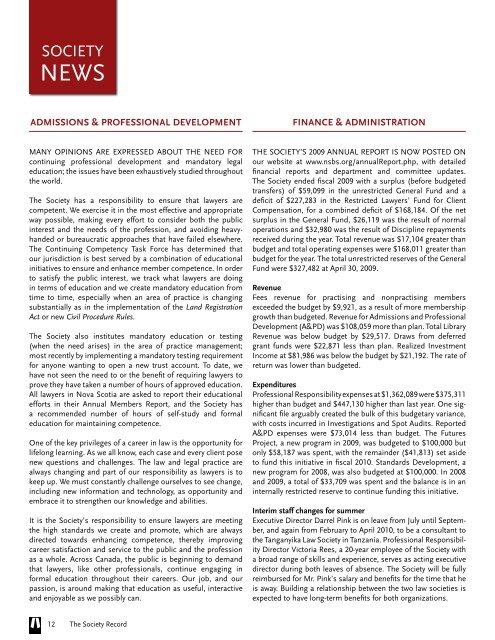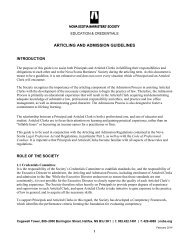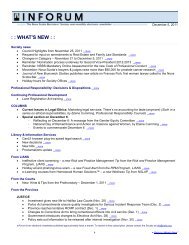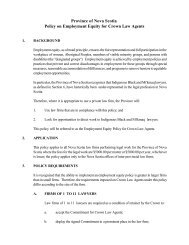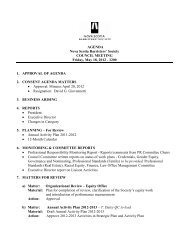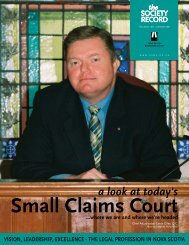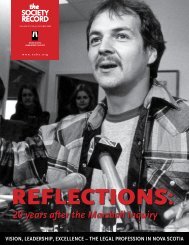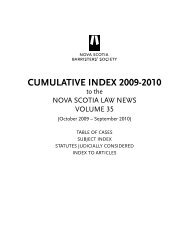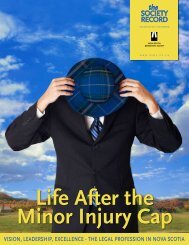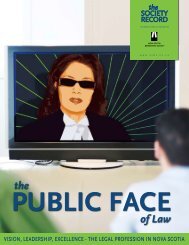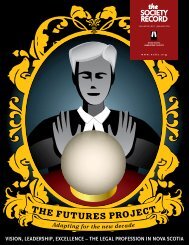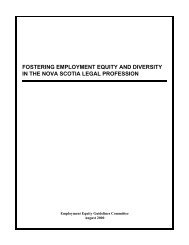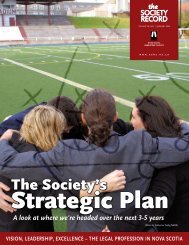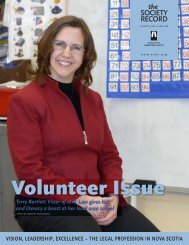SR Vol 27 No 3, July 2009 - Nova Scotia Barristers' Society
SR Vol 27 No 3, July 2009 - Nova Scotia Barristers' Society
SR Vol 27 No 3, July 2009 - Nova Scotia Barristers' Society
Create successful ePaper yourself
Turn your PDF publications into a flip-book with our unique Google optimized e-Paper software.
society<br />
news<br />
Admissions & Professional Development<br />
Finance & Administration<br />
Many opinions are expressed about the need for<br />
continuing professional development and mandatory legal<br />
education; the issues have been exhaustively studied throughout<br />
the world.<br />
The <strong>Society</strong> has a responsibility to ensure that lawyers are<br />
competent. We exercise it in the most effective and appropriate<br />
way possible, making every effort to consider both the public<br />
interest and the needs of the profession, and avoiding heavyhanded<br />
or bureaucratic approaches that have failed elsewhere.<br />
The Continuing Competency Task Force has determined that<br />
our jurisdiction is best served by a combination of educational<br />
initiatives to ensure and enhance member competence. In order<br />
to satisfy the public interest, we track what lawyers are doing<br />
in terms of education and we create mandatory education from<br />
time to time, especially when an area of practice is changing<br />
substantially as in the implementation of the Land Registration<br />
Act or new Civil Procedure Rules.<br />
The <strong>Society</strong> also institutes mandatory education or testing<br />
(when the need arises) in the area of practice management;<br />
most recently by implementing a mandatory testing requirement<br />
for anyone wanting to open a new trust account. To date, we<br />
have not seen the need to or the benefit of requiring lawyers to<br />
prove they have taken a number of hours of approved education.<br />
All lawyers in <strong>No</strong>va <strong>Scotia</strong> are asked to report their educational<br />
efforts in their Annual Members Report, and the <strong>Society</strong> has<br />
a recommended number of hours of self-study and formal<br />
education for maintaining competence.<br />
One of the key privileges of a career in law is the opportunity for<br />
lifelong learning. As we all know, each case and every client pose<br />
new questions and challenges. The law and legal practice are<br />
always changing and part of our responsibility as lawyers is to<br />
keep up. We must constantly challenge ourselves to see change,<br />
including new information and technology, as opportunity and<br />
embrace it to strengthen our knowledge and abilities.<br />
It is the <strong>Society</strong>’s responsibility to ensure lawyers are meeting<br />
the high standards we create and promote, which are always<br />
directed towards enhancing competence, thereby improving<br />
career satisfaction and service to the public and the profession<br />
as a whole. Across Canada, the public is beginning to demand<br />
that lawyers, like other professionals, continue engaging in<br />
formal education throughout their careers. Our job, and our<br />
passion, is around making that education as useful, interactive<br />
and enjoyable as we possibly can.<br />
The <strong>Society</strong>’s <strong>2009</strong> Annual Report is now posted on<br />
our website at www.nsbs.org/annualReport.php, with detailed<br />
financial reports and department and committee updates.<br />
The <strong>Society</strong> ended fiscal <strong>2009</strong> with a surplus (before budgeted<br />
transfers) of $59,099 in the unrestricted General Fund and a<br />
deficit of $2<strong>27</strong>,283 in the Restricted Lawyers’ Fund for Client<br />
Compensation, for a combined deficit of $168,184. Of the net<br />
surplus in the General Fund, $26,119 was the result of normal<br />
operations and $32,980 was the result of Discipline repayments<br />
received during the year. Total revenue was $17,104 greater than<br />
budget and total operating expenses were $168,011 greater than<br />
budget for the year. The total unrestricted reserves of the General<br />
Fund were $3<strong>27</strong>,482 at April 30, <strong>2009</strong>.<br />
Revenue<br />
Fees revenue for practising and nonpractising members<br />
exceeded the budget by $9,921, as a result of more membership<br />
growth than budgeted. Revenue for Admissions and Professional<br />
Development (A&PD) was $108,059 more than plan. Total Library<br />
Revenue was below budget by $29,517. Draws from deferred<br />
grant funds were $22,871 less than plan. Realized Investment<br />
Income at $81,986 was below the budget by $21,192. The rate of<br />
return was lower than budgeted.<br />
Expenditures<br />
Professional Responsibility expenses at $1,362,089 were $375,311<br />
higher than budget and $447,130 higher than last year. One significant<br />
file arguably created the bulk of this budgetary variance,<br />
with costs incurred in Investigations and Spot Audits. Reported<br />
A&PD expenses were $73,014 less than budget. The Futures<br />
Project, a new program in <strong>2009</strong>, was budgeted to $100,000 but<br />
only $58,187 was spent, with the remainder ($41,813) set aside<br />
to fund this initiative in fiscal 2010. Standards Development, a<br />
new program for 2008, was also budgeted at $100,000. In 2008<br />
and <strong>2009</strong>, a total of $33,709 was spent and the balance is in an<br />
internally restricted reserve to continue funding this initiative.<br />
Interim staff changes for summer<br />
Executive Director Darrel Pink is on leave from <strong>July</strong> until September,<br />
and again from February to April 2010, to be a consultant to<br />
the Tanganyika Law <strong>Society</strong> in Tanzania. Professional Responsibility<br />
Director Victoria Rees, a 20-year employee of the <strong>Society</strong> with<br />
a broad range of skills and experience, serves as acting executive<br />
director during both leaves of absence. The <strong>Society</strong> will be fully<br />
reimbursed for Mr. Pink’s salary and benefits for the time that he<br />
is away. Building a relationship between the two law societies is<br />
expected to have long-term benefits for both organizations.<br />
12 The <strong>Society</strong> Record


